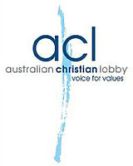 Is the Australian Christian Lobby the least theologically-literate lobby group in the country?
Is the Australian Christian Lobby the least theologically-literate lobby group in the country?
They may well be, for according to their latest newsletter, ‘A marriage plebiscite is … the only way that, as Christians, we can secure both the future of marriage, and our freedoms to believe and practice our faith’.
This piece of brilliant propaganda might be the least Christian statement on marriage that I’ve ever read. What an embarrassment these people are to the Good News.
They’re certainly right about one thing, however: ‘There’s more at stake this election [sic] than marriage’. But even on that subject, the institution of marriage is far too important to be left to the likes of the ACL to define it.
[Update: Within minutes of this little post going live, the Australian Christian Lobby blocked me from the ability to post comments on, or even to ‘Like’, their Facebook page. (As far as I am aware, this is a first for me.) So much for being about promoting ‘public contributions of the Christian faith reflected in the political life of the nation’.]
Whilst I may not agree with ACL about many things, what in this post illustrates your accusation that they are ‘Theologically illiterate’? Their statement you quote is a legislative ideal rather then theological.
I personally think should be removed from legislation entirely but I also think you have made no case for your assertion.
LikeLike
I’m not sure if Jason has anything specifically in mind, but here are 5 brief critical observations:
The tabloid theology, suffused with passive-aggressiveness and a hysterical, almost apocalyptic tone, and geared to shut down rather than open up serious thinking and exploration.
The sloganeering, dog-whistle moralising of the language of “values”, the theological equivalent of the kind of government-speak Orwell described as “designed … to give an appearance of solidity to pure wind”. No significant theological ethics can be done under the rubric of “values”.
The disingenuous colonising of the word “Christian” with a specifically conservative/evangelical agenda. Nothing new here, I know, but the arrogant claim to theological hegemony and purity never ceases to piss me off.
Hooray for the outcry for “the world’s poorest and most vulnerable”. But let’s be honest: the emphasis is on looking after our own. Just another example of the tribalism of the Christianity on offer here.
The overarching theme: not the common good, but securing our place as Christians in the Gomorrah of Oz. It’s quite unseemly.
LikeLike
@Josh: Thanks for your question/comment. For any Christian to claim that the only way that the future of marriage can be secure (to use the ACL’s lingo) is via a popular – or even a parliamentary – vote evidences a significant failure to understand the most fundamental realities of marriage itself – both its God-ordained character, and the free decision of the persons in question. As my own free church tradition has insisted, there is no need at all for the Christian community to look to something as novel and flimsy as the State to define marriage for us. This is not to say for a moment that marriage is merely a ‘spiritual’ and ‘private’ affair about which the State ought to have no interest (a subject on which I’ve blogged before), but the ACL’s rhetoric on marriage is just nonsense as far as Christian theology – and history – goes. Hell, it’s practically atheistic. It sponsors a way of being human that is severely at odds with the shape of the divine life witnessed to in Philippians 2, to take just one pivotal example, and it confuses the responsibilities of the church with that of the state. An obsession with power conceived along the ACL’s lines will therefore always corrupt theology.
Plebiscite or no plebiscite, the church must do its own work on the questions of marriage and not subcontract that responsibility to the State whose concerns vis-à-vis marriage are different, albeit no less important, than those of the Christian community. This will mean – at least in my context – trying to recreate some mechanisms and spaces where such important and difficult work might be undertaken with theological integrity and maturity … and patience. Some attempts at doing that were made a few years ago by the Presbyterian Church of Aotearoa New Zealand. You can read about that here.
@Kim: Amen x 5.
LikeLike